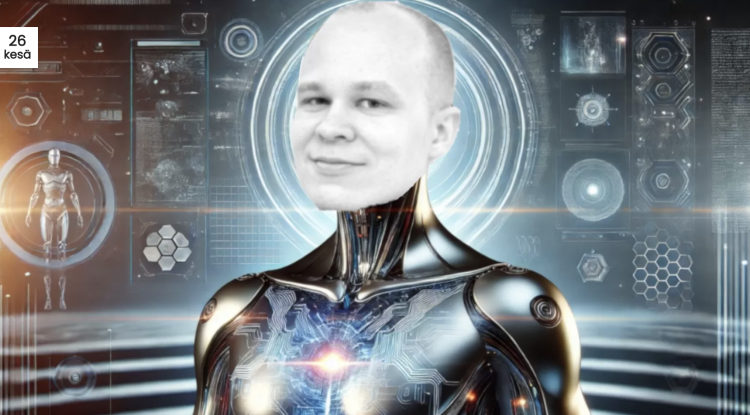AI: Don’t Ignore the Hype

![]() Already in December 2022, after trying ChatGPT for the first time, I was convinced that we were witnessing a significant technological breakthrough. Now that I have used ChatGPT Plus and GPT-4o for a couple of weeks, I am even more convinced of it.
Already in December 2022, after trying ChatGPT for the first time, I was convinced that we were witnessing a significant technological breakthrough. Now that I have used ChatGPT Plus and GPT-4o for a couple of weeks, I am even more convinced of it.
Don’t worry, I’m not jumping on the most extreme AI hype train. For example, GitHub Copilot has been a disappointment for me. It is somewhat helpful in automating boilerplate when writing tests, but in my case, it has been of surprisingly little help for production code.
Programmers are definitely not going anywhere either, even though, as everyone says, the nature of programming work is changing.
However, it has changed in the past as well: for example, we rarely write Assembly anymore. Now, the level of abstraction in routine work will only rise higher, perhaps faster than ever before. This is why enabling our consultants to leverage AI is also a key component of Buutti’s current strategy.
Furthermore, I don’t think that superhuman intelligence is just around the corner (although I now estimate it will happen much earlier than I used to). Technological development likely follows more of an S-curve, where after the initial breakthroughs, development will gradually level off as we continue to apply new technology and increase computing power, until the next big leap occurs.
Still, over the past year and a half, I’ve encountered many dismissive claims about the significance of AI and LLMs, which I strongly disagree with. Here, I will address some of the most common arguments, drawing from my own experiences.
”ChatGPT has no intelligence, it only uses pattern matching and predicts the next word!”
What does intelligence really mean?
One might argue, looking at social media for example, that people too are just text generators repeating patterns they’ve learned, even more tiresomely and useless than ChatGPT. In what way, for example, is the speech produced in a coffee table conversation significantly different from the speech that ChatGPT can produce, in terms of content or the principles by which it is produced? I would argue that my programming work isn’t fundamentally different from this 95% of the time. Advanced chess or go AIs supposedly have no intelligence either, but still they just happen to beat you at chess and go.
”The AI has no real understanding of the things it says.”
What does understanding mean? What does it mean to understand something? Is it, for example, being able to explain and apply the concepts you grasp? ChatGPT seems to do fairly well in these.
Recently, I’ve been learning about quantum mechanics using ChatGPT. It has explained complex concepts to me in a comprehensible way that I haven’t been able to clarify satisfactorily with Google, Wikipedia, YouTube, or even other people. So, at the very least, it can convey understanding more effectively than most humans.
Additionally, my use of StackOverflow and similar sites has plummeted. No more dealing with posts where someone asks the same technical question I’m facing and then replies, ”No problem, found the answer,” without sharing the solution.
”Artificial intelligence, using current LLM technology, can never surpass the average human in any area of knowledge.”
This may very well be true. However, if something comes close to being as good as the average person in a given field across a wide range of knowledge areas, and is also thousands of times faster, endlessly patient, and able to combine knowledge from all these areas, that sounds pretty impressive to me, even if it doesn’t exceed the average.
Moreover, if artificial intelligence even comes close to reaching the average in most areas of knowledge, it implies that AI renders the efforts of half of us redundant.
”This artificial intelligence thing hasn’t really taken off or achieved anything concrete besides an advanced chatbot.”
Well, in my case, even the switch from GPT-3.5 to GPT-4o has caused the vast majority of my Google use to be replaced by ChatGPT, which I find quite amazing in itself. With GPT-4o, I can ask for feedback on my code, track bugs, learn how to use new tools, figure out poorly documented configurations, translate features from one programming language to another, and produce usable functions in seconds.
Artificial intelligence integration tools, libraries, and frameworks are also maturing and developing constantly. For example, Hugging Face offers easy-to-use tools for testing and retraining open-source LLM models, as well as downloading them to your own computer. LlamaIndex and LangChain, on the other hand, provide tools for developing LLM applications.
In addition, companies are investing huge sums in artificial intelligence, especially in the USA, and GPT-5 is also not so far away… so if you don’t notice anything revolutionary yet, I just say: wait for it.
”Artificial intelligence does not know how to be creative! It only combines existing data”
This is basically true. But how often do you yourself come up with something entirely new, rather than combining existing ideas in a clever way? I would say that few of us programmers produce only cutting-edge code without extensively utilizing existing solutions, practices, and techniques. On the contrary, I would argue that the vast majority of programming involves repeating familiar principles. Many of us developers may think we are more exceptional than we actually are.
Similarly, how often do even the most respected artists create something completely unique? In literature and screenwriting, for example, the phrase ”Shakespeare did it” exists for a reason.
”Current LLM artificial intelligence does not know logic, so it is still weaker than human intelligence”
Again, basically true. The principles of LLMs are based on deep learning and advanced pattern recognition. Compared to human intelligence, this corresponds to intuitive System 1 thinking rather than System 2-style logical reasoning. However, GPT-4o can still perform math very well.
Let me illustrate why the apparent lack of logical reasoning is less of a limitation than one might think. I recently read the famous Sherlock Holmes novel, The Hound of the Baskervilles. I asked ChatGPT how Sherlock Holmes would have tracked down the main culprit if they hadn’t made certain mistakes during the story. It provided very competent logical explanations for how the famous detective could have succeeded. I then asked the chatbot how it could make such hypothetical reasoning without relying on logic. It explained that it uses pattern recognition and information synthesis, combining details about forensic science, the structure of detective novels, character behavior, and investigation procedures to produce an answer.
Thanks to the LLM’s advanced pattern recognition, it can mimic logical reasoning so well that it’s confusingly similar to fully valid logical reasoning, often more convincing than many humans are capable of. And, surprise, surprise, most of the code in the world is basically just repeating the same patterns.
”AI is not reliable: it makes mistakes and hallucinates”
Again, true. But people make mistakes too—often even more so than AI. Based on my experiences so far, ChatGPT seems to be much more reliable in producing information than Google, which is no small feat. I certainly make mistakes all the time when programming, probably at least as much as ChatGPT.
”After all, these are nothing but similar deep learning algorithms that have been presented since the 80s.”
Yes, that may very well be true. But theory and practice are different things. The principles may have been known for decades, but their effective application to this level of concreteness has also required decades of research. If equally useful automated aids to programming were available, say, ten years ago, I was not aware of them.
And of course, as one might guess, AI has been used extensively to produce this text as well. I might not even be human myself—who knows?
Miikka Salmi, COO at Buutti Oy

























































